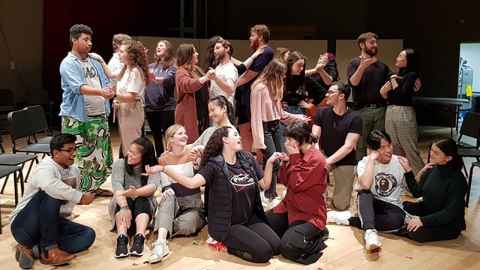Behind the scenes of the Opera Scenes
6 September 2019
Opera Scenes, the annual production put on by the School of Music, will this year present scenes from two popular operatic hits with a 1960s Fellini-esque twist.

Around 30 voice students will perform the second act of Mozart's The Marriage of Figaro and the second act of Strauss’ Die Fledermaus – both capturing something of the spirit of Italy circa La Dolce Vita.
The production is co-directed by the School of Music’s Dr Gregory Camp, a choral singer, senior lecturer in musicology, music theory and musicianship, and Catrin Johnsson, a renowned mezzo soprano and performance teacher at the School.
Why these particular operas? “Both operas have large casts, which is a necessity when you have 30 people to cast,” says Dr Camp. Also, from an opera singer’s point of view “it doesn’t get much better than Mozart.
“Mozart is ideal for study. It’s more sing-able than, say, Wagner or Verdi for a developing singer, but has all the depth of any opera you can think of.” Strauss is similar, he says. “He’s under-rated as ‘light opera’ but he’s just as vocally challenging, sometimes more so. There’s nothing light about light opera.”
Both have themes that that have appealed to audiences throughout the centuries. “They’re both about class. 'Figaro' is about class resentment, the lower class resenting the upper class, trying to outsmart the upper class, and succeeding. 'Fledermaus' is about the complacency and boredom of the upper class.”
Hence the setting. “This class conflict is relevant to 1960s Italy, a time of great social and economic change, so I chose that setting to bring together the two operas.”
There's nothing light about light opera
Disguise is often a popular plot device in opera, and there will be characters who are not what they seem. “With Die Fledermaus you’ve got a Russian prince who is sung by a woman but is a man, a Hungarian countess who isn’t a countess, and a French marquis who isn’t a marquis,” explains Ms Johnsson.
A woman pretending to be a boy is often known as a “trouser role” in opera, a type of role that Ms Johnsson as mezzo soprano has often played herself. “In Mozart’s time they loved all that gender play, but modern audiences love it just as much.”
Figaro will be sung in Italian, and Die Fledermaus will be sung in English, a translation from the German written by Dr Camp. “I found ten different translations and cobbled together the parts I liked the best.” This may make it sound easier than it was; it also means matching the syllables, aligning the right vowel-sounds with the right notes, putting the jokes in the right places and so on.
Both note that putting on an opera requires more than just a pretty voice.
“The students performing are the opera singers of tomorrow,” says Dr Camp. “It’s about learning how it works; how to work with stage directors, with conductors, with each other, with music directors, the etiquette of how to behave on stage and back stage, and about learning how to respond to the audience.”
Ms Johnsson agrees. “It means learning the language and poetry of an opera, the techniques of acting – which includes learning to fall without hurting yourself, how to lift someone without hurting yourself, how to walk in character, how to fight, how to kiss in character.”
“So putting on a performance turns theory into something practical, and for students, it’s thrilling.”
Opera Scenes
20 to 22 September
Music Theatre, School of Music
Book and prepay through Eventbrite
Media contact
Margo White I Media adviser
DDI 09 923 5504
Mob 021 926 408
Email margo.white@auckland.ac.nz